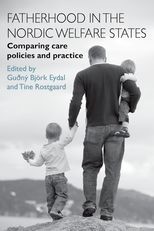 Fatherhood in the Nordic Welfare states: Comparing care policies and practice
Fatherhood in the Nordic Welfare states: Comparing care policies and practice
Contents
-
-
-
-
-
-
-
-
-
-
-
-
-
Introduction Introduction
-
Conceptualising paternal involvement in the Danish context Conceptualising paternal involvement in the Danish context
-
Defining paternal involvement in the intact family Defining paternal involvement in the intact family
-
Outcomes: operationalising separated/divorced fathers’ relationships to their children Outcomes: operationalising separated/divorced fathers’ relationships to their children
-
Analytical framework Analytical framework
-
-
Data and methods Data and methods
-
Early paternal involvement and the probability of nuclear family dissolution Early paternal involvement and the probability of nuclear family dissolution
-
Early paternal involvement and the relationship with the child after family break-up Early paternal involvement and the relationship with the child after family break-up
-
Socio-demographic characteristics of socially included and marginalised (divorced) fathers in 2011 Socio-demographic characteristics of socially included and marginalised (divorced) fathers in 2011
-
Conclusion Conclusion
-
Notes Notes
-
References References
-
-
-
-
-
-
-
-
-
-
Twelve The long-term impacts of early paternal involvement in childcare in Denmark: what happens after nuclear family dissolution
Get access-
Published:November 2014
Cite
Abstract
This chapter examines the association between the social practices of fathering before and after family break up, by exploring how the configuration of the (late) modern fatherhood, the caregiving father in the intact family, is related to the configuration of the increasingly involved father of divorce. Using data from the Danish Longitudinal Study of the 1995 Cohort the study focuses on the short term and long term) implications of father involvement in child care (parental leave and daily care during early childhood). Results show that lack of paternal involvement in early childhood is associated with risk of nuclear family dissolution, also in a long term perspective. The analysis leaves a more mixed picture regarding the associations between fathering before and after family breakup: No impact of family policy measures can be demonstrated, whereas the legal ties between the members of family as well as the social practices of everyday life in the intact family appear to be important for the post-separation parental construction. Moreover, the analysis suggests that divorced fathers, positioned in the top of the occupational hierarchy, are more likely to keep contact with their 15-year-old child, compared to divorced fathers who are outside the labour market.
Sign in
Personal account
- Sign in with email/username & password
- Get email alerts
- Save searches
- Purchase content
- Activate your purchase/trial code
- Add your ORCID iD
Purchase
Our books are available by subscription or purchase to libraries and institutions.
Purchasing information| Month: | Total Views: |
|---|---|
| November 2022 | 1 |
| November 2023 | 2 |
| February 2024 | 2 |
| March 2024 | 2 |
| January 2025 | 2 |



Get help with access
Institutional access
Access to content on Oxford Academic is often provided through institutional subscriptions and purchases. If you are a member of an institution with an active account, you may be able to access content in one of the following ways:
IP based access
Typically, access is provided across an institutional network to a range of IP addresses. This authentication occurs automatically, and it is not possible to sign out of an IP authenticated account.
Sign in through your institution
Choose this option to get remote access when outside your institution. Shibboleth/Open Athens technology is used to provide single sign-on between your institution’s website and Oxford Academic.
If your institution is not listed or you cannot sign in to your institution’s website, please contact your librarian or administrator.
Sign in with a library card
Enter your library card number to sign in. If you cannot sign in, please contact your librarian.
Society Members
Society member access to a journal is achieved in one of the following ways:
Sign in through society site
Many societies offer single sign-on between the society website and Oxford Academic. If you see ‘Sign in through society site’ in the sign in pane within a journal:
If you do not have a society account or have forgotten your username or password, please contact your society.
Sign in using a personal account
Some societies use Oxford Academic personal accounts to provide access to their members. See below.
Personal account
A personal account can be used to get email alerts, save searches, purchase content, and activate subscriptions.
Some societies use Oxford Academic personal accounts to provide access to their members.
Viewing your signed in accounts
Click the account icon in the top right to:
Signed in but can't access content
Oxford Academic is home to a wide variety of products. The institutional subscription may not cover the content that you are trying to access. If you believe you should have access to that content, please contact your librarian.
Institutional account management
For librarians and administrators, your personal account also provides access to institutional account management. Here you will find options to view and activate subscriptions, manage institutional settings and access options, access usage statistics, and more.